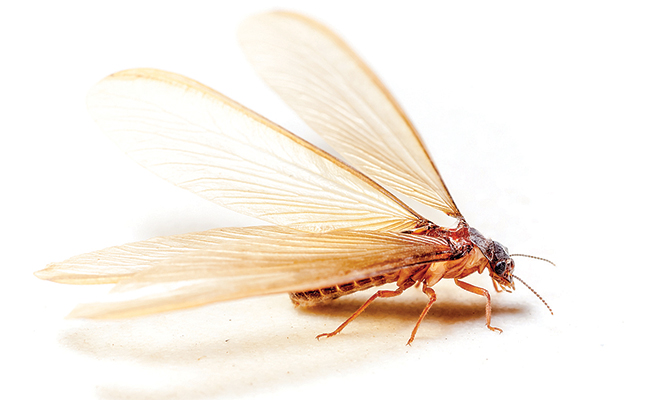Termite management is both rewarding and lucrative, PMP’s annual reader survey shows.
The importance of termite management cannot be overstated, especially for homeowners. In the United States, more than 600,000 homes sustain termite damage, a U.S. Department of Agriculture report1 shows. Termites eat away at structures undetected, causing hundreds of thousands of dollars in damages.
That’s why termite management is especially rewarding for many pest management professionals (PMPs).
“We get to help stop, or prevent, damage from harming their largest investment,” says Joshua Sheppard, owner of Sentry Pest Control in Jefferson, Ga.
Like many southern states, Georgia has plenty of termite activity, he says. Partnering with real estate agents and pest management companies that do not offer services that target wood-destroying insects (WDI) leads to termite management work, he says.
The majority of the PMPs who answered Pest Management Professional’s (PMP’s) 2018 Termite Management Survey are located in southern states. Half as many PMPs have locations in the Midwest, the survey shows.
Existing residential structures account for the majority of termite management work, PMP’s survey shows. Of those asked, 66 percent generate more than half of their termite management revenue servicing existing residential structures.
It looks like termite work will be needed no matter where a PMP is located. In 2018, total housing starts are expected to rise 5.6 percent, whereas single-family housing starts are projected to increase 8.2 percent, according to data from Kiplinger2, publisher of business forecasts and personal finance news.
Sales of new and existing homes also are expected to be on the upswing in 2018, rising 9.8 percent and 1.6 percent, respectively, Kiplinger says.
The majority of the PMPs who responded to the survey said existing residential structures account for most of their termite management revenue.
“With the increase in residential building, we plan to aggressively pursue pretreats for local subdivisions,” Sheppard says. “This will mean we need to be prepared to use all treatment options available to us.”
The majority of survey respondents rely on liquid treatments, with 57 percent expecting to generate more than half of their termite management revenue from these products.
A year of growth
When asked to predict the growth rate of termite jobs, 93 percent of the PMPs who answered the survey expect their termite management services to grow.
Samuel “Kelly” Littlejohn, owner of Certified Termite & Pest Control in Hallsville, Texas, expects 2018 to be his best year ever.
“I have really concentrated on growth the past few years, and 2017 was no exception,” he adds. “Due to marketing ideas and referral plans we have implemented, 2018 is going to be a great year.”
Littlejohn asks current customers for referrals and involves them in the entire termite management process. For example, during the inspection phase, he points out conducive conditions and the reasons why termites are drawn to these areas. In the treatment phase, he explains why he prefers to use a particular termiticide and what makes it the best choice for their home.
“Customers really appreciate it, and are highly likely to refer you to friends and family,” Littlejohn says.
For John Freel, termite division manager for Ace Pest Control in North Webster, Ind., termite work is very satisfying and gratifying to do, too. New construction in the area over the past several years is starting to show signs of termite pressure.
“New additions in several older farm parcels are the areas we are starting to treat for termites,” he says.
After 34 years in business, Don Lenegar, president of Lenegar’s Pest & Moisture Services in Virginia Beach, Va., says he is expanding his business in the coastal areas, where termite pressure is high — due, in part, to moisture issues. Reputation and customer service are good for business. He points out that when your company’s name and brand are the bottom line, even in a big city, understanding customers’ concerns and letting them know you stand behind your product is imperative.
“Sixty-five percent of my termite work is word of mouth,” he says. “We have to investigate everything around the issue, but most of all protect our name. Listen to your customers and their concerns. Have faith in the product you use.”
Sheppard’s advice to PMPs looking to improve sales is simple: Focus on your company’s services and not your competition.
“Quit trying to win by being the cheapest. Be the best and charge accordingly,” he says. “Doing this will help you live better, and it will help better the industry as a whole.”
At Sentry Pest Control, Sheppard says he increased prices to meet the quality of the work he and his team offer. He has continued to close sales, while increasing profits and growing his staff’s income.
Lenegar notes that knowledge and training help boost sales.
“Termite work can be beneficial if your employees are educated and well trained,” he explains. “It opens the door to many other services.”
Lenegar, whose company mission statement reads, in part — Inspect, Identify, Evaluate, Eliminate, Educate — says the most rewarding aspect of termite management is solving problems and educating customers.
“If other companies want to use cheaper products just to get the job,” he says, “they really don’t have the passion in building our industry’s reputation out of the days when the public saw us as just ‘bug people.’”
The destruction termites cause can be devastating to homeowners. Although an uptick in housing starts and home sales may be good for business, many PMPs offer termite management services simply because they find it rewarding to help others.
“Termite management is extremely satisfying, but it is something you shouldn’t do unless you are 100 percent committed to being the best,” Littlejohn says. “Continually educating yourself on the fascinating world of termites is the key to a very lucrative career.”
References
1. “What ‘Wood’ a Termite Prefer To Eat?”
2. “Tight Inventory Spurs Prices”
You can reach Managing Editor Diane Sofranec at dsofranec@northcoastmedia.net or 216-706-3793.



Leave A Comment